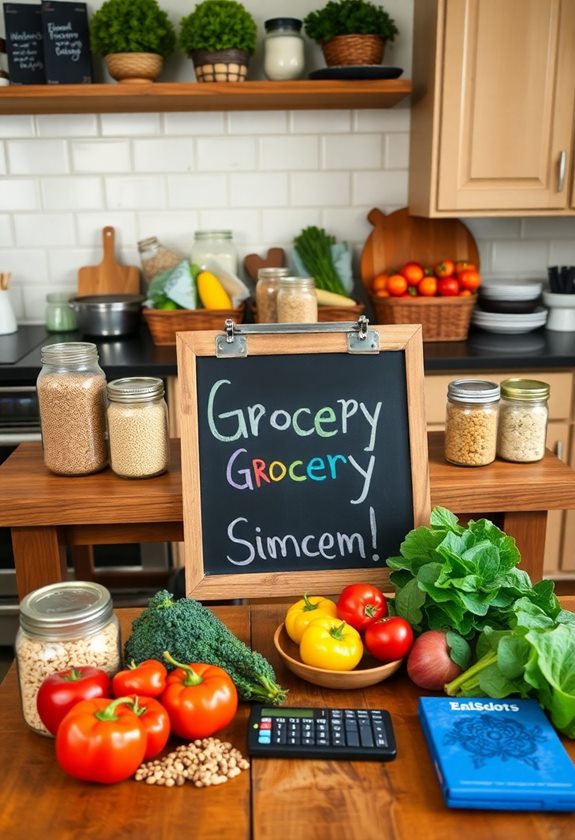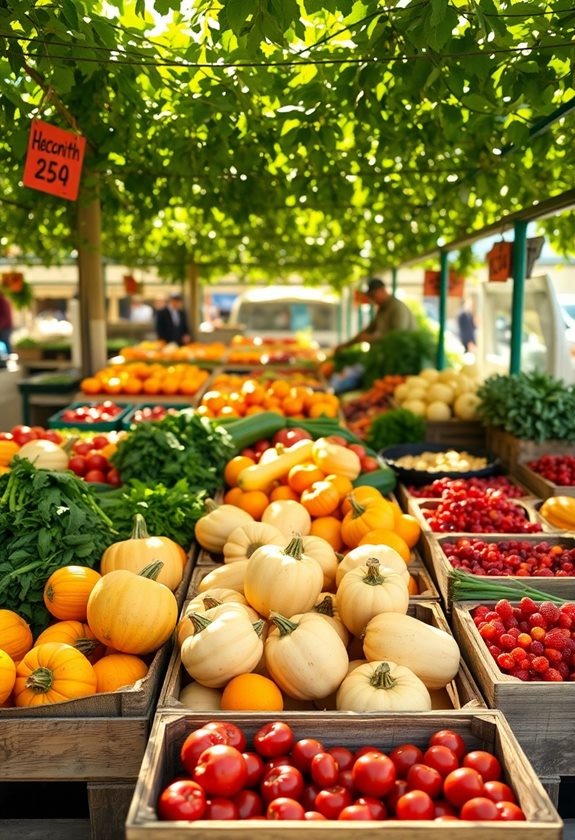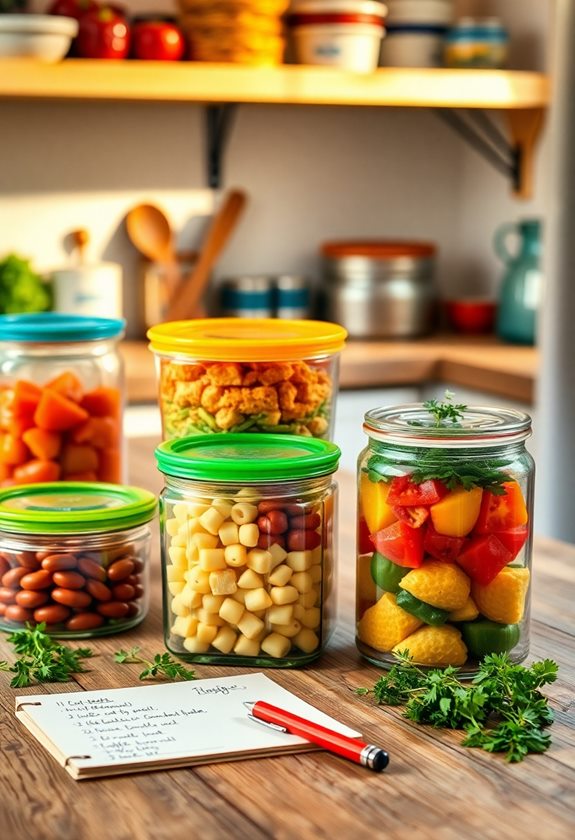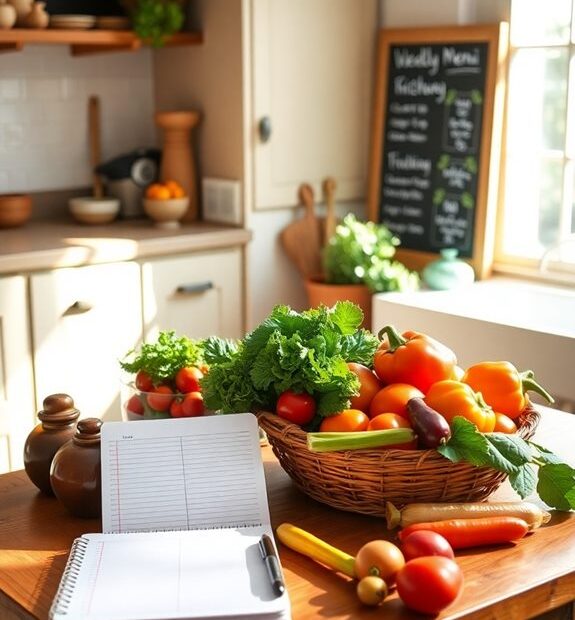You can save money and eat delicious meals with these budget-friendly meal planning tips! First, track your grocery expenses for a month to understand your spending. Then, create a flexible meal plan that uses seasonal ingredients for better taste and lower costs. Have you tried batch cooking? Making larger portions can save both time and money! Don't forget about leftovers! They can be repurposed into new meals, like tasty stir-fries. By following these simple strategies, you'll enjoy your meals without breaking the bank. Want even more ideas to spice up your planning? There's plenty more to explore.
Key Takeaways
- Track grocery expenses to identify spending patterns and set a clear weekly budget to manage costs effectively.
- Plan meals using core ingredients that can be repurposed across multiple dishes to reduce waste and save money.
- Incorporate seasonal ingredients from local farmers' markets to enhance flavor and lower grocery expenses.
- Utilize batch cooking by preparing larger portions of meals that freeze well for easy future meals.
- Repurpose leftovers creatively to minimize waste and save time on busy nights, integrating them into new meals.
Assess Your Grocery Budget

To effectively manage your grocery budget, start by taking a close look at your current spending habits. Have you ever thought about where your money goes each week? Tracking your grocery expenses can reveal surprising patterns. Grab a notebook or use an app, and jot down everything you spend on food for a month. You might find that incorporating budget-friendly cooking guides could help you make more informed choices while shopping.
Next, categorize your spending. How much goes to fresh produce, snacks, or ready-made meals? This breakdown helps you see where you can cut back. For example, do you really need that fancy brand of chips every week?
Another tip is to set a clear budget. Decide how much you can comfortably spend each week. Remember, this isn't about strict rules; it's about finding what works best for you.
Lastly, think about the impact of impulse buys. Have you ever walked into the store for a few items and left with a cart full? If you plan your trips and stick to your list, you'll save money.
Create a Flexible Meal Plan
Creating a flexible meal plan can greatly enhance your ability to stick to your grocery budget. When you plan meals, it's important to leave some room for change. Why? Life happens! Maybe you'll get invited to dinner or you'll find a great deal on a different protein. To optimize your meal prep, consider investing in essential tools like the Mueller Pro-Series 10-in-1 Vegetable Chopper for quick and efficient meal preparation. Start by choosing a few core ingredients that you can use in multiple dishes. For example, if you buy chicken, you can grill it one night, stir-fry it another, and even toss it in a salad. This not only saves you money but also cuts down on waste!
Next, think about your schedule. If you know you'll be busier on certain days, plan simpler meals for those times. Does a quick pasta dish sound good? Or how about a veggie-packed smoothie?
Utilize Seasonal Ingredients

Taking advantage of seasonal ingredients can greatly reduce your grocery costs while enhancing the flavor of your meals. Why pay more for out-of-season produce when you can enjoy fresher, tastier options? Seasonal ingredients are often cheaper because they're abundant, and they can help you create delicious dishes that celebrate local flavors. Incorporating diverse recipes using fresh, seasonal produce allows you to explore new tastes and keep your meals exciting.
Here are some tips to make the most of seasonal ingredients:
- Visit local farmers' markets: You'll find fresh, in-season produce and support your community.
- Plan your meals around what's in season: Check what fruits and veggies are available this week. It can inspire new recipes!
- Experiment with new recipes: Try cooking something you've never made before with seasonal goodies. It's a fun way to mix up your meals!
Batch Cooking Strategies
Batch cooking is a smart way to save time and money in the kitchen. By preparing larger portions of food in one go, you can cut down on both cooking time and grocery bills. Have you ever thought about how much time you spend cooking every night? Instead, imagine dedicating just a few hours one day a week to create delicious meals in advance!
Start by picking a few recipes that you love. Choose dishes that freeze well, like soups, stews, or casseroles. Next, gather all your ingredients and set aside a specific day to cook. You'll be amazed at how much you can whip up when you focus!
Once your meals are cooked, portion them into containers. Label each one with the date and contents. This way, you'll always know what's in your freezer and when it was made.
Also, don't forget to mix it up! Rotate your recipes each week so you don't get bored. With batch cooking, you not only save time but also enjoy homemade meals throughout the week. Isn't that a win-win? 🍽️✨
Leftovers for Future Meals

Leftovers can be a lifesaver when it comes to meal planning, allowing you to whip up quick and easy dinners without any extra cooking. Instead of letting food go to waste, think of leftovers as a chance to save time and money. You can transform those extra portions into new meals that are just as delicious!
Here are some fun ideas to enjoy your leftovers:
- Repurpose: Turn your roast chicken into a flavorful chicken salad or soup the next day.
- Freeze: Save portions for later. Soups, stews, or casseroles freeze well and can be a comforting meal on a busy night.
- Mix and Match: Combine leftover grains with veggies and a protein for a quick stir-fry or grain bowl.
Have you ever thought about how much you can do with what's already in your fridge? By using leftovers wisely, you'll reduce waste, save money, and make meal prep a breeze. Plus, you'll find it's a creative way to keep your meals exciting! So, the next time you cook, think about how those extra servings can make your future meals even easier. 🍽️
Frequently Asked Questions
How Can I Involve My Family in Meal Planning?
Involving your family in meal planning's a fun way to bond, but it can also lead to disagreements. Set aside time each week for everyone to share their ideas and preferences, making meals enjoyable for all.
What Are Some Easy Vegetarian Meal Ideas?
You can try simple vegetarian meals like veggie stir-fry, lentil soup, or caprese salad. Whip up a chickpea curry, or make stuffed bell peppers. These meals are delicious, nutritious, and easy to prepare for everyone!
How Do I Store Leftovers Properly?
Did you know that 30-40% of food in the U.S. gets wasted? To store leftovers properly, cool them quickly, use airtight containers, and label with dates. You'll save money and help reduce waste.
Can I Meal Prep for Specific Dietary Restrictions?
Absolutely, you can meal prep for specific dietary restrictions! Just plan your meals around those needs, choose suitable ingredients, and label everything clearly. This way, you'll stay organized and guarantee you meet your dietary goals.
What Kitchen Tools Can Help With Meal Planning?
To streamline meal planning, you'll want a sharp knife, cutting board, measuring cups, and storage containers. A slow cooker or instant pot can save time, while a meal planner app helps you organize your recipes efficiently.

